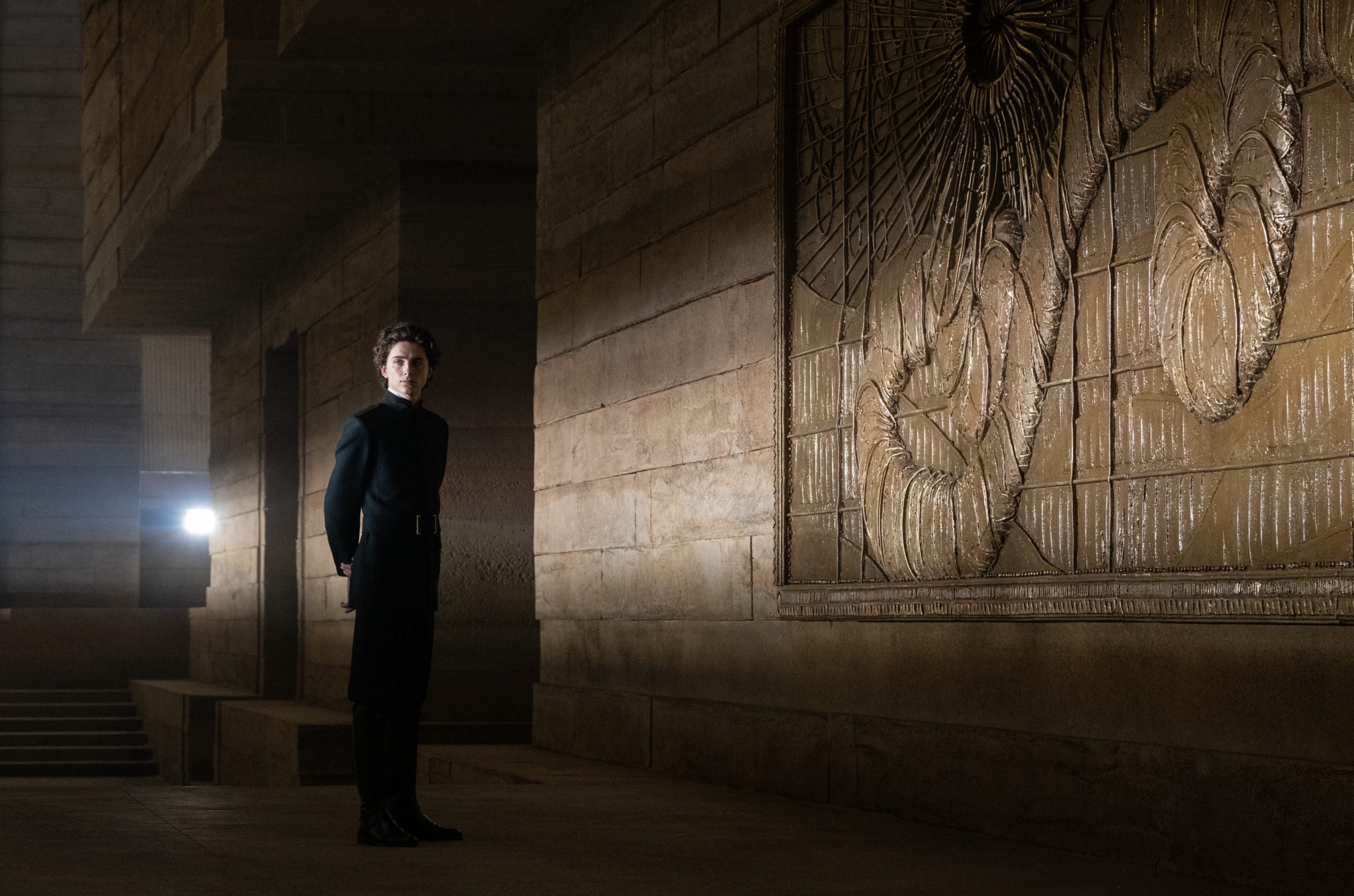Timothée Chalamet (pictured) as Paul Atreides
Not even the dunes of Arrakis could smother the massive-scale retelling of Frank Herbert’s 1965 DUNE and psychedelic-inducing spice pales in comparison to the vision Denis Villeneuve achieves. But with that, we still have to ask: Is Dune a “white-savior” story?
Note from the author: In an attempt to bridge the cinematic aspect of DUNE with its social connotations, this will not just be a simple review that mines for cinematic gold and comments on cinematic language only. Instead, it will dissect the mastery of Denis Villeneuve’s film and bridge its themes to briefly connect to post-colonialism in Hawaiʻi.
Fair warning: This review contains spoilers.
While past efforts to adapt—or almost adapt—Frank Herbert’s DUNE by the likes of David Lynch and Alejandro Jodorowsky are quilted together under the memory of failure, the fruits of Herbert’s popular, immeasurably influential, and acclaimed science-fiction book remained ripe for the taking. That is, until Denis Villeneuve dove into the sand dunes of Herbert’s world and emerged as a type of messianic Kwisatz Haderach himself. The “fruits” from which I speak of are the themes of Herbert’s 1965 novel: religion, power, and ecological war. But Villeneuve extracts these ideas and exploits them to his desire. In other words, Denis Villeneuve focuses on colonization, or extractive colonization, as an extension of corrupted power, which contrasts Herbert’s original ideas. But more on that later. Let’s first dive into the cinematic world of the 2021 feature film, DUNE.
Being one of the novels that inspired George Lucas’ ever-growing world of STAR WARS and having won the Hugo and Nebula awards, it can seem like a daunting force to behold—let alone adapt into a 165 million dollar movie. But Denis Villeneuve, the director of eulogized features such as ARRIVAL and SICARIO, manages to harvest the Homeric aspect of the novel to reflect a spice-induced dream. And it’s one that unfolds on a massive scale, but not in a quixotic way; from Hans Zimmer’s masterful and eerie score—a chorus of rock and electronic sounds colliding with ominous voices that whisper in shadowy corners—to its own version of a frightening creature that resurrects a “you’re gonna need a bigger boat” sensibility.
The world that the ARRIVAL director crafts only grows from there. Frank Herbert’s ideas that are envisioned by Villeneuve manifests into an coalescence of Romanesque and industrial-like architecture, every crack enclosed by slabs of sharply and thinly carved concrete, with each homeworld or nobel house individualized by saturated palettes of silver, blood-red orange, or steaming cold blues. These colors and the set design, while pleasurable to look at, lend a hand in distinguishing the many different worlds of DUNE but still manages to keep every planet or intergalactic-whatever aesthetically symbiotic. With interstellar spaceships that carve tsunamis in the oceans of Caladan and anatomically-familiar (if you know what I mean) sand-worms of Arakkis, there’s not much left to the imagination of the viewer. Denis Villeneuve manages to build these worlds for you, but he doesn’t insult your intelligence in doing so. Instead, the daunting compositions suggest that there’s something lurking underneath the surface of it all—as though the camera is not yet ready to reveal something sinister to you. DUNE may feel like something out of a Kubrick movie—a slow burn and unapologetically palatial—but Denis Villeneuve is very specific. Not everything is revealed at once. Its “Svengalian” nature is unraveled through the perspective of Paul Atreides, vulnerably portrayed by Timothée Chalamet.
As the story opens, a rattling and distorted voice speaks: Dreams are messages from the deep. At this point, the audience is unaware of the context behind such words. But it becomes clear that these visions are prophetic upon the first few glimpses of Chani (Zendaya), a Fremen girl from Arrakis that litters Paul’s dreams, though he is unsure of who she is and what the dreams mean. Villeneuve distinguishes Paul’s dreams from reality often with slow motion movements, focusing on objects (like knives, bugs, sand, blood, and hands) or a character’s features (often the blue encased eyes of Fremen), ultimately handing you pieces to a puzzle he wants to reveal to you by the conclusion. But dreams are briefly focused on in Villeneuve’s adaptation despite its importance—unlike David Lynch’s adaptation. They’re more like glimpses or approximations of the future. Instead, Villeneuve attempts to build every moment, conversation, and sequence for the final betrayal of House Atreides, committed by the jealous Imperial Emperor and put into action by the evil House Harkonnen ruled over by Baron Vladimir (Stellan Skarsgard).
Additionally, Villeneuve’s cast supports his grand vision aptly. With Timothée Chalamet as the hero known as Paul Atreides, a quiet strength is sensed in his performance. Namely, Paul’s test first showcases’ Chalamet’s capacity to depict the character originally while also nodding to the original source’s protagonist. The scene revolves around the revelation that Paul could be “The One” or the Kwisatz Haderach. It’s played smartly by Chalamet who employs fear, confusion, and layered bravery—showing glimpses of Paul’s arc—as his hand enters the mysterious box in the face of Bene Gesserit Reverend Mother (Charlotte Rampling). Villeneuve does not employ Baron Vladimir as frequently as Lynch’s version. Instead, he cuts between House Atreides preparing to make peace with the Fremen and the slothly Baron’s brief meetings with advisors and Truthsayers to help bring an end to House Atreides. The Baron reflects Kurtz in Francis Ford Copolla’s APOCALYPSE NOW quite fiercely, which works aptly with Villeneuve’s intentions of exploiting the theme of colonization. Villeneuve falters, though, on two occasions when it comes to utilizing his stacked cast; Josh Brolin brings a likability to Gurney Halleck but is scarcely utilized, while the same respect goes to Oscar Isaac playing Duke Leto, having not spent enough time on his discussions of the politics of the Fremen and Arakkis. But the mystifying Lady Jessica, bravely portrayed by Rebecca Ferguson, is employed to her capacity as she reinvents the character to be the essence of power, enigmas, and spirituality. In addition, Jason Momoa’s Duncan Idaho is among the most notable performances in the adaptation. His amiability and austerity is only explored through the purity in which his performance is seen, and it’s thusly reflected in his relationship with Paul.
Villeneuve is obviously a fan of LAWRENCE OF ARABIA and 2001: A SPACE ODYSSEY, as he implements visuals that reflect epic moments from each. But he also brings his own “spice” to the table. Villeneuve always lets the camera linger on a moment—some say it’s too long for their taste. But it helps to craft an atmosphere of preternaturalism (something Herbert would be proud to gaze upon), and the succinct and brief moments of dialogue exploit the nature of what Villeneuve tries to craft. That is, an epic that’s speechless; he wants you to dive into the world of DUNE through his own imagination, or if you will, his dreams rather than through explanation. Successfully, he builds the story to erupt upon the attack against House Atreides. It’s a slow build, starting with a paralyzing dart to the back of Duke Leto and also revealing the betrayal of Dr. Yueh, House Atreides’ Suk doctor (that’s Dune-talk for intelligent, loyal medicine man or healer). The betrayal includes fiery explosions, space-ships that make Star Wars’ equipment seem rudimentary, and carefully designed fight sequences. The attack is staged like something out of a Shakespearean play though—it’s brooding and dark. But what ensues thereafter, Lady Jessica and Paul being chased across a desert for their survival, highlights Denis Villeneuve’s admiration for the character of Paul who quickly grows from reticent child to an unmatched warrior.
You share the perspective of many characters throughout the story, gathering small pieces of information that helps to support the final scenes of DUNE when Paul finally finds the Fremen after escaping the attack on his family and is challenged with a duel to the death, which he wields to his success. The moment the audience has been waiting for finally arrives; the Fremen are confronted by Paul and his mother, dreams are unraveling into clarity, and Chani becomes an obvious catalyst for the next installment of the film. It is in those sun-dried deserts that the story comes together. It’s where the audience can recognize Paul’s dreams as philosophical and poetic. Paul becomes the sought-after Muad’Dib (prophesied as the leader to free the Fremen) and walks into the desert with the Fremen like the Nine Walkers of THE LORD OF THE RINGS. But above all, it’s where the Fremen are introduced to exploit Frank Herbet’s original themes: power and corruption.
This brings us to the theme of colonization (and extractive colonization). Denis Villeneuve has stated that DUNE is an attempt to critique the “white savior” trope but many critics ponder the opposite. Though Frank Herbert denies crafting his story around colonization, it’s difficult to escape it with a plot that focuses on the disruption of indigenous people’s way of life and even the murder of such people. But Villeneuve drives this idea in his adaptation, unlike David Lynch or even the three-part mini-series by Vittorio Storaro. He presents the idea first with the soft-spoken words from the lips of Chani, the Fremen girl of Paul’s dreams. Specifically, in the opening dialogue of the film, Chani whispers, “who will our next oppressors be?”
As many are already aware, the plot is primarily centered around the feudal system of the Known Universe where aristocratic houses ruling certain planets oversee the production of spice, an obvious allegory for oil but within the story, a naturally produced resource credited with being the primary commerce and aid in technological development. In other words, when the spice flows, the money flows too. Spice is harvested on the beautiful planet of Arrakis where the indegnous people called Fremen are perpetually in a fight for their land against the impending harvesters. At the beginning of the story, the sinister House Harkonnens have been overseeing production for 80 years but finally retreat (resistfully) upon the request of the mysterious and shadowy Imperial Emperor. This is where House Atreides enters as the new stewarts, and they’re presented as the saviors of the indigenous people of Arakkis by desiring for peace and even with timid Paul’s interest in the Fremen’s culture, tactics, and sacred ecology.
There are parallels to be drawn in modern societies that reflect the world of DUNE; the USA’s invasion of Iraq for oil, England’s colonization of India for resources, or the illegal annexation of the Islands of Hawaiʻi for its strategic position in the Pacific, resulting in a bountiful tourism industry that harvests its indigenous people’s culture for profit. While Hawaiʻi wasn’t colonized for its resources alone like many others, Hawaiʻi often finds itself at odds with its settlers who pluck the culture, language, and utopia-esque ecology from the hands of its indegenous population to enhance their business, instagram, and whatnot—it is still a ravaging of land and thusly, its people. The idea of extractive colonization is realized in Herbert’s and Villeneuve’s versions of the story. Ecological warfare is ripping at the seams as different houses, and even the Emperor, fight for resources on the topographically characterized Arakkis, ultimately harming the Fremen as a result and hindering Arakkis from becoming the paradise they dreamed of crafting. The archipelagic Hawaiʻi is often described as “paradise,” but to many Native Hawaiians, it’s idyllic features were lost upon the arrival of Captain Cook, and they’re still waiting for its return, much like the Fremen.
Hawaiʻi is teeming with a myriad of different cultures, aptly credited with the USA’s territorial ownership of the islands before its illegal annexation, ultimately opening doors to immigrants from across the globe to work on plantations. As seen in Villeneuve’s adaptation, Arakkis is occupied by many ethnic features and varying backgrounds. This may very well be because of Herbert’s novel, but it also highlights a specific feature of Villeneuve’s version. By and large, Villeneuve desires to frame the savior of the Fremen as antithetical to a liberator. But admittedly, you can only see flashes of this realization (and can only come to fruition if properly presented in Dune Part 2). After the death of Paul’s father, Duke Leto, Paul has visions of the future, showing the negative results of his utilization of the Fremen that bring about war and destruction, making him more of an anti-hero than the savior of the Known Universe. In the islands of Hawaiʻi, whispers of a known savior has seemingly uplifted the people from savagery (the United States annexing Hawaiʻi), but with high rates of Native Hawaiian women being tied to sexual slavery (prostitution being unknown to Kanaka Maoli until the arrival of Captain Cook), the death of sacred land to prioritize scientific discovery, and the auctioning of culture for profit, Paul Atreides and other such saviors have more in common than originally conceived. To wit, the envisioning of Paul as the “white savior” is arguably correct, but Denis Villeneuve seems to dig deeper. This excavation can be realized in the context of Hawaiʻi and places abroad, only highlighting Villeneuve’s vision as an enigmatic sand storm that can be pieced together with examples from historic and modern society. But peeling back the golden-hued surface of it all, DUNE can be seen as a recontextualization of the “good” colonizer compared to the “bad” one (obviously House Atreides being “good” and House Harkkonen being “bad”). In the end, Villeneuve seems to be beginning a sentence that will ultimately end in Part 2: power in the hands of someone with good intentions always denotes the opposite pedigree. Denis Villeneuve may frame Paul Atreities as the hero in DUNE: PART 1, but the Fremen still ask: who will our next oppressors be?



